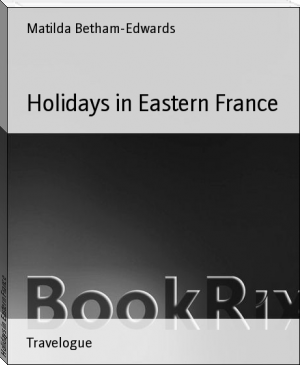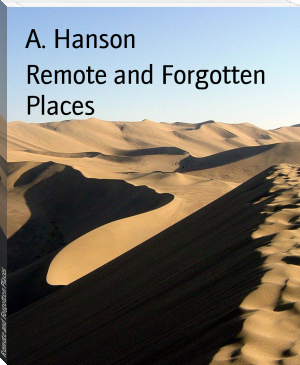Holidays in Eastern France - Matilda Betham-Edwards (best ereader for manga txt) 📗

- Author: Matilda Betham-Edwards
Book online «Holidays in Eastern France - Matilda Betham-Edwards (best ereader for manga txt) 📗». Author Matilda Betham-Edwards
PREFACE.
"Travelling in France without hotels, or guide-books," might, with very little exaggeration, be chosen as a title to this volume, which is, indeed, the record of one visit after another among charming French people, and in delightful places, out of the ordinary track of the tourist. Alike in the valley of the Marne--amongst French Protestants at Montbeliard--at Besancon amid the beautiful scenery of the Doubs--at Lons-le-Saunier, from whence so many interesting excursions were made into the Jura--in the very heart of the Jura highlands--at Champagnole, Morez, and St. Claude, it was my good fortune to see everything under unique and most favourable auspices, to be no tourist indeed, but a guest, welcomed at every stage, and pioneered from place to place by educated ladies and gentlemen delighted to do the honours of their native place. Thus it came about that I saw, not only places, but people, and not only one class, but all, peasant and proprietor, Protestant and Catholic, the bourgeoisie of the towns, the mountaineers of the highlands, the schoolmaster, the pastor, the cure. Wherever I went, moreover, I felt that I was breaking new ground, the most interesting country I visited being wholly unfamiliar to the general run of tourists, for instance, the charming pastoral scenery of Seine and Marne, the picturesque valleys of the Doubs and the Loue, and the environs of Montbeliard and Besancon, the grand mountain fastnesses, close-shut valleys, or combes, the solitary lakes, cascades, and torrent rivers of the Jura.
Many of the most striking spots described in these pages are not even mentioned in Murray, whilst the difficulty of communication renders them comparatively unknown to the French themselves, only a few artists having as yet found them out. Ornans--Courbet's birth and favourite abiding place, in the valley of the Loue--is one of these. St. Hippolyte, near Montbeliard, is another, and a dozen more might be named equally beautiful, and, as yet, equally unknown. New lines of railway, however, are to be opened within the next few years in several directions, and thus the delightful scenery of Franche-Comte will, ere long, be rendered accessible to all. For the benefit of those travellers who are undaunted by difficulties, and prefer to go off the beaten track even at the risk of encountering discomforts, I have reprinted, with many additions, the following notes of visits and travel in the most interesting part of Eastern France, which, in part, originally appeared in "Frazer's Magazine," 1878.
In a former work, "Western France," I treated of a part of France which was ultra-Catholic; in this one I was chiefly among the more Protestant districts of the whole country, and it may be interesting to many to compare the two.
CONTENTS.
CHAPTER I. The Valley of the Marne
CHAPTER II. Noisiel: the City of Chocolate
CHAPTER III. Provins and Troyes
CHAPTER IV. Among French Protestants at Montbeliard
CHAPTER V. St. Hippolyte, Morteau, and the Swiss Borderland
CHAPTER VI. Besancon and its Environs
CHAPTER VII. Ornans, Courbet's Country, and the Valley of the Loue
CHAPTER VIII. Salins, Arbois, and the Wine Country of the Jura
CHAPTER IX. Lons-le-Saunier
CHAPTER X. Champagnole and Morez
CHAPTER XI. St. Claude: the Bishopric in the Mountains
CHAPTER XII. Nantua and the Church of Brou
APPENDIX.
Itineraries.--Outlines of Franc-Comtois History. Notes on the Geology of the Jura
Index
CHAPTER I.
THE VALLEY OF THE MARNE.
How delicious to escape from the fever heat and turmoil of Paris during the Exhibition to the green banks and sheltered ways of the gently undulating Marne! With what delight we wake up in the morning to the noise, if noise it can be called, of the mower's scythe, the rustle of acacia leaves, and the notes of the stock-dove, looking back as upon a nightmare to the horn of the tramway conductor, and the perpetual grind of the stone-mason's saw. Yes! to quit Paris at a time of tropic heat, and nestle down in some country resort is, indeed, like exchanging Dante's lower circle for Paradise. The heat has followed us here, but with a screen of luxuriant foliage ever between us and the burning blue sky, and with a breeze rippling the leaves always, no one need complain.
With the cocks and the hens, and the birds and the bees, we are all up and stirring betimes; there are dozens of cool nooks and corners if we like to spend the morning out of doors, and do not feel enterprising enough to set out on an exploring expedition by diligence or rail. After the midday meal everyone takes a siesta, as a matter of course, waking up between four and five o'clock for a ramble; wherever we go we find lovely prospects. Quiet little rivers and canals winding in between lofty lines of poplars, undulating pastures and amber cornfields, picturesque villages crowned by a church spire here and there, wide sweeps of highly cultivated land interspersed with rich woods, vineyards, orchards and gardens--all these make up the scenery familiarized to us by some of the most characteristic of French painters.
Just such tranquil rural pictures have been portrayed over and over again by Millet, Corot, Daubigny, and in this very simplicity often lies their charm. No costume or grandiose outline is here as in Brittany, no picturesque poverty, no poetic archaisms; all is rustic and pastoral, but with the rusticity and pastoralness of every day.
We are in the midst of one of the wealthiest and best cultivated regions of France moreover, and, when we penetrate below the surface, we find that in manner and customs, as well as dress and outward appearance, the peasant and agricultural population, generally, differ no little from their remote country-people, the Bretons. In this famous cheese-making country, the "Fromage de Brie" being the speciality of these rich dairy farms, there is no superstition, hardly a trace of poverty, and little that can be called poetic. The people are wealthy, laborious, and progressive. The farmers' wives, however hard they may work at home, wear the smartest of Parisian bonnets and gowns when paying visits. I was going to say when at church, but nobody does go here!
It is a significant fact that in the fairly well to do educated district, where newspapers are read by the poorest, where well-being is the rule, poverty the exception, the church is empty on Sunday, and the priest's authority is nil. The priests may preach against abstinence from church in the pulpits, and may lecture their congregation in private, no effect is thereby produced. Church-going has become out of date among the manufacturers of Brie cheese. They amuse themselves on Sundays by taking walks with their children, the pater-familias bathes in the river, the ladies put on their gala dresses and pay visits, but they omit their devotions.
Some of these tenant-farmers, many of the farms being hired on lease, possessors of small farms hiring more land, are very rich, and one of our neighbours whose wealth had been made by the manufacture of Brie cheese lately gave his daughter a 100,000 francs, L40,000, as a dowry. The wedding breakfast took place at the Grand Hotel, Paris, and a hundred guests were invited to partake of a sumptuous collation. But in spite of fine clothes and large dowries, farmers' wives and daughters still attend to the dairies, and, when they cease to do so, doubtless farming in Seine et Marne will no longer be the prosperous business we find it. It is delightful to witness the wide-spread well-being of this highly-farmed region.
"There is no poverty here," my host tells me, "and this is why life is so pleasant."
True enough, wherever you go, you find well-dressed, contented-looking people, no rags, no squalor, no pinched want. Poverty is an accident of rare occurrence, and not a normal condition, everyone being able to get plenty of work and good pay. The habitual look of content written upon every face is very striking. It seems as if in this land of Goshen, life were no burden, but matter of satisfaction only, if not of thankfulness. Class distinction can hardly be said to exist; there are employers and employed, masters and servants, of course, but the line of demarcation is lightly drawn, and we find an easy familiarity wholly free from impoliteness, much less vulgarity, existing between them.
That automatic demureness characterizing English servants in the presence of their employers, is wholly unknown here. There are households with us where the servants might all be mutes for any signs of animation they give, but here they take part in what is going on, and exchange a word and a smile with every member of the household, never dreaming that it should be otherwise. One is struck too here by the good looks, intelligence, and trim appearance of the children, who, it is plain, are well cared for. The houses have vines and sweet peas on the wall, flowers in the window, and altogether a look of comfort and ease found nowhere in Western France. The Breton villages are composed of mere hovels, where pigs, cows, and poultry live in close proximity to their owners, a dung-hill stands before every front door, and, to get indoors and out, you have always to cross a pool of liquid manure. Here order and cleanliness prevail, with a diffusion of well-being, hardly, I should say, to be matched out of America.
Travellers who visit France again and again, as much out of sympathy with its people's institutions as from a desire to see its monuments and outward features, will find ample to reward them in Seine et Marne. On every side we have evidence of the tremendous natural resources and indefatigable laboriousness of the people. There is one point here, as elsewhere in France, which strikes an agriculturist with astonishment, and that is the abundance of trees standing amid cornfields and miscellaneous crops, also the interminable plantation of poplars that can be seen on every side, apparently without any object. But the truth is, the planting of apple and pear trees in fields is no extravagance, rather an economy, the fruit they produce exceeding in value the corn they damage, whilst the puzzling line of poplars growing beside canals and rivers is the work of the Government, every spare bit of ground belonging to the State being planted with them for the sake of the timber. The crops are splendid partly owing to the soil, and partly to the advanced system of agriculture. You may see exposed for sale, in little towns, the newest American agricultural implements, whilst the great diversity of products speaks volumes for the enterprise of the farmers.
As you stroll along, now climbing, now descending this pleasantly undulated country, you may see growing in less than an acre, a patch of potatoes here, a vineyard there, on one side a bit of wheat, oats, rye, and barley, with fruit-trees casting abundant shadow over all; on the other Indian corn, clover and mangel-wurzel in the green state, recently planted for autumn fodder; further on a poppy field, three weeks ago in full flower, now having full pods ready for gathering--the opium poppy being cultivated for commerce here--all these and many more are found close together, and near them many a lovely little glen, copse, and ravine, recalling Scotland and Wales, while the open hill-sides show broad belts of pasture, corn and vineyard. You may walk for miles through what seems one vast orchard, only, instead of turf, rich crops are growing under the trees. This is indeed the orchard





Comments (0)